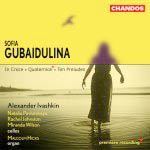
In croce o Ten Preludes o Quaternion
 $35.00
Out of Stock
$35.00
Out of Stock6+ weeks add to cart
GUBAIDULINA
In croce o Ten Preludes o Quaternion
Alexander Ivashkin (cello)
[ Chandos Classics / CD ]
Release Date: Tuesday 30 October 2001
This item is currently out of stock. It may take 6 or more weeks to obtain from when you place your order as this is a specialist product.
three works for cello by this contemporary Russian composer.
Chandos presents three works for cello, one in its premiere recording, by this contemporary Russian composer.
In the 1960s, together with the composers Edison Denisov and Alfred Schnittke, Sofia Gubaidulina inaugurated a new period in Soviet music, bravely exploring Western avant-garde techniques on Russian soil. During the last two decades she has achieved international recognition and her distinctive compositions are performed by leading orchestras, soloists and chamber groups all over the world.
Alexander Ivashkin is the first performer and dedicatee of works by many great contemporary composers, among them Alfred Schnittke. He has a rapidly growing discography of twentieth-century Russian music on Chandos and his recordings of works by Schnittke and Roslavets have been very well received.
Malcolm Hicks has enjoyed a long, full-time professional career as keyboard player and conductor in London and around the world. Natalia Pavlutskaya plays and records internationally and is a teacher of international stature. Rachel Johnston is the winner of the International Cello Competition in Liezen, Austria and is one of the best young cellists of her generation. Miranda Wilson performs extensively as a soloist and chamber musician.
Gubaidulina's Ten Preludes originally bore the title 'Ten Studies' as the pieces had been intended as pedagogical exercises which demonstrated unusual ways of dealing with traditional cello techniques. However, the highly artistic character of the pieces, which really are studies in expression rather than technique, meant that their collective title was changed. Together the Ten Preludes constitute an encyclopaedia of Gubaidulina's style of writing for a stringed instrument, combining scrupulous research into new expressive and colouristic timbres with a detailed representation of emotions.
In Croce means 'On the cross' but also refers to the 'crossing' parts of the two instruments. The cello starts in the low register, gradually ascending; the organ in the high register, finishing with a very low cluster. The cello part is micro-tonal at the beginning and perfectly diatonic at the end, while the organ part starts in a clear A major and finishes with a kind of indistinct 'whispering'.
Quaternion is one of Gubaidulina's most dramatic compositions, written for a quartet of solo cellos. The composer here introduces a new sound world in which the instruments are used in very unusual ways. Cellos 3 and 4 are tuned a quarter-tone below cellos 1 and 2. One section of the piece is to be played with thimbles on the fingers of the right hand. Typically for Gubaidulina, various harmonies occur in a symbolic context. The main musical idea is a juxtaposition of 'existence' and 'spiritual essence', the former represented by stopped notes, the latter by harmonics produced at the same point on the string.
Tracks:
In croce
Ten Preludes for solo cello
Quaternion for cello quartet